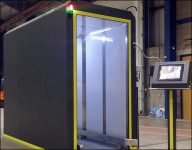
British laundry shops use RFID technology to manage items in the laundry
[ad_1]
Fishers Services, a commercial washing and textile leasing company, used RFID readers in the Glasgow “Super Laundry” to read the labels attached to the linen provided to customers, all bags, and roll-proof rolls used to ship the linen products. In this way, the company You can understand the time of receipt, washing and delivery to customers. By using the RFID system provided by UBI, the washing company can not only better manage the inventory of linen products, but also share this information with customers.
Since 1900, Fishers began to provide work clothes and linen laundry services in Scotland. Now, the company begins to lease its own linen products, such as sheets, bedding and towels from hotels and restaurants; customers can wash, dry, fold or return them at the nearby Fishers washing shop.

(In order to record the receipt of dirty items, Fishers installed an RFID portal with a built-in Impinj Speedway Revolution R420 reader and 4 circularly polarized antennas)
Fishers Services said the company has been growing. The company can wash/iron every two weeks and deliver more than 2 million items. In March 2016, the company opened a “super laundromat” in Glasgow. According to Michael Jones, the company’s management manager, the company serves a total of 2,000 hotels, while the new Glasgow store serves 300 customers in a 50-mile radius.
Due to the huge business volume, Fishers has encountered some loss of items for which the responsibility could not be determined. The company’s annual revenue is approximately 52.7 million U.S. dollars, and the annual loss caused by expenses is as high as 1.5 million U.S. dollars. As a result, Fishers began to seek solutions to simplify the entry and exit of items into and out of the washing facility and identify the time and location of lost items.
In the past few years, the washing company has been very interested in RFID technology, but the previous RFID tags could not be used in harsh washing environments. Over the past few years, more and more rugged laundry tags have been introduced on the market, and the company has also tested a piece of software to manage RFID data in the server. However, the software encountered some difficulties in its deployment and use. On the one hand, the RFID system needs to be turned on for 24 hours to ensure the collection and connection of all read data, which also means that other software in the store also needs to run for 24 hours. In addition, the company hopes that customers can log in to the system to view the linen products used or the clothing being washed data, which also requires Fishers to open the IT system permissions for customers, which puts more requirements on security.
Jones said that UBI provides a better option. Its system uses a touch screen to connect to the software in the cloud server.
Fishers has a total of 7 stores. In its new store in Glasgow, the company used an automated system to track ZHEN products, bags, and metal roll cages used to transport linen products. In mid-December 2015, the company and UBI signed a contract, and the solution was officially put into use when the store opened.
Fishers tagged 4,000 roll cages and 7,000 bags in the Glasgow washing shop. Pegasus Textiles, a linen product supplier, has marked 200,000 ZHEN linen products. The bag and metal roll cage use the Inotec label.
Fishers installed an RFID portal with a built-in Impinj Speedway Revolution R420 reader and 4 circularly polarized antennas to record the receipt of dirty items. The dirty linen conveyor belt is also equipped with 2 additional Impinj readers.
After cleaning and sorting, these items will be placed in a cage or bag and delivered to the customer. Next, employees need to place the bag and cage in the tunnel reader with the built-in Impinj reader and UBI multiplexer and antenna on the transfer dock. At the delivery dock, the employee will use the touch screen to input information such as the customer, the number of items, and bind it with the tag ID. These data are stored in the software in the server.
When the linen products are delivered to the washing shop, employees will place them on the conveyor belt and upload them to the washing area. Impinj on the conveyor beltReaderAfter reading the container label ID and ZHEN linen, the relevant information will be updated in the software. After the item is received in the washing area, the tag will be read again to create a washing record.
Munier said that the UBI program software can track inventory and movement of items. It can also track the return rate and washing time. Since the technology can track individual ZHEN items, it can also determine how many linen products are still available.
The customer uses the password to log in to the UBI software and view information about linen products. Munier said: “Customers can view real-time information about the returned linen through the web interface.”
Munier said: “Our system has been developed for 8 years and has been put into use in 300 locations, including the washing market, logistics, tool management and planning fields.”
Jones said the goal of the system is to better understand the location of linen products. If the technology works well, he hopes to install this system in some of his clients’ hotels or distribute handheld readers to users to increase visibility.
Jones predicts that in the long run, intelligent systems will help make Fishers product-related initiatives, such as which products need to be replaced more frequently. It can also remind Fishers customers if they experience higher frequency losses or product damage.
In the next few years, Fishers will install the RFID technology in at least four washing shops.
[ad_2]



